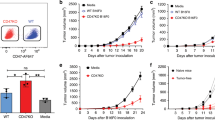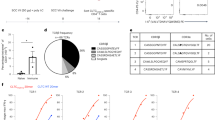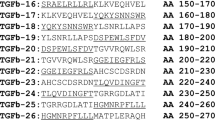Abstract
Large tumor burdens in advanced non-small-cell lung carcinoma (NSCLC) are thought to be immunosuppressive. To determine whether CD8-mediated immune responses could be elicited in stage IIIB/IV NSCLC patients, 14 subjects were immunized several times with allogeneic NSCLC cells transfected with CD80 (B7.1) and HLA-A1 or A2. Patients enrolled were matched or unmatched at the HLA A1 or A2 locus and their immune response compared. Immunization significantly increased the frequencies of interferon-γ secreting CD8 T cells in all but one patient in response to ex vivo challenge with NSCLC cells. The CD8 response of matched and unmatched patients was not statistically different. NSCLC reactive CD8 cells did not react to K562. Clinically, five of 14 patients responded to immunization with stable disease or partial tumor regression. The study demonstrates that CD8 Ifn-γ responses against nonimmunogenic or immunosuppressive tumors can be evoked by cellular vaccines even at advanced stages of disease. The positive clinical outcome suggests that nonimmunogenic tumors may be highly susceptible to immune effector cells generated by immunization.
This is a preview of subscription content, access via your institution
Access options
Subscribe to this journal
Receive 12 print issues and online access
$259.00 per year
only $21.58 per issue
Buy this article
- Purchase on Springer Link
- Instant access to full article PDF
Prices may be subject to local taxes which are calculated during checkout



Similar content being viewed by others
References
Woo EY, Yeh H, Chu CS, et al. Cutting edge: regulatory T cells from lung cancer patients directly inhibit autologous T cell proliferation. J Immunol. 2002;168:4272–4276.
Hasegawa Y, Takanashi S, Kanehira Y, Tsushima T, Imai T, Okumura K . Transforming growth factor-beta1 level correlates with angiogenesis, tumor progression, and prognosis in patients with nonsmall cell lung carcinoma. Cancer. 2001;91:964–971.
Honegger AE, Hofer EL, Baranao RI, et al. Interleukin-1 beta, transforming growth factor beta 1, prostaglandin E2, and fibronectin levels in the conditioned mediums of bone marrow fibroblast cultures from lung and breast cancer patients. Ann Hematol. 2002;81:80–85.
McHugh RS, Shevach EM . The role of suppressor T cells in regulation of immune responses. J Allergy Clin Immunol. 2002;110:693–702.
Kusmartsev S, Gabrilovich DI . Immature myeloid cells and cancer-associated immune suppression. Cancer Immunol Immunother. 2002;51:293–298.
Tamm I, Schriever F, Dorken B . Apoptosis: implications of basic research for clinical oncology. Lancet Oncol. 2001;2:33–42.
Ng CS, Novick AC, Tannenbaum CS, Bukowski RM, Finke JH . Mechanisms of immune evasion by renal cell carcinoma: tumor-induced T-lymphocyte apoptosis and NFkappaB suppression. Urology. 2002;59:9–14.
Lappin MB, Campbell JD . The Th1-Th2 classification of cellular immune responses: concepts, current thinking and applications in haematological malignancy. Blood Rev. 2000;14:228–239.
Steinbrink K, Graulich E, Kubsch S, Knop J, Enk AH . CD4(+) and CD8(+) anergic T cells induced by interleukin-10-treated human dendritic cells display antigen-specific suppressor activity. Blood. 2002;99:2468–2476.
Powell JD, Bruniquel D, Schwartz RH . TCR engagement in the absence of cell cycle progression leads to T cell anergy independent of p27(Kip1). Eur J Immunol. 2001;31:3737–3746.
Tamada K, Tamura H, Flies D, et al. Blockade of LIGHT/LTbeta and CD40 signaling induces allospecific T cell anergy, preventing graft-versus-host disease. J Clin Invest. 2002;109:549–557.
Kudo H, Matsuoka T, Mitsuya H, Nishimura Y, Matsushita S . Cross-linking HLA-DR molecules on Th1 cells induces anergy in association with increased level of cyclin-dependent kinase inhibitor p27(Kip1). Immunol Lett. 2002;81:149–155.
Tham EL, Shrikant P, Mescher MF . Activation-induced nonresponsiveness: a Th-dependent regulatory checkpoint in the CTL response. J Immunol. 2002;168:1190–1197.
Gilliet M, Liu YJ . Human plasmacytoid-derived dendritic cells and the induction of T-regulatory cells. Hum Immunol. 2002;63:1149–1155.
Shortman K, Liu YJ . Mouse and human dendritic cell subtypes. Nat Rev Immunol. 2002;2:151–161.
Thompson AG, Thomas R . Induction of immune tolerance by dendritic cells: implications for preventative and therapeutic immunotherapy of autoimmune disease. Immunol Cell Biol. 2002;80:509–519.
Rosenberg SA . Karnofsky Memorial Lecture. The immunotherapy and gene therapy of cancer. J Clin Oncol. 1992;10:180–199.
Nigam A, Yacavone RF, Zahurak ML, et al. Immunomodulatory properties of antineoplastic drugs administered in conjunction with GM-CSF-secreting cancer cell vaccines. Int J Oncol. 1998;12:161–170.
Pardoll DM . Cancer vaccines. Nat Med. 1998;4:525–531.
Johnston JV, Malacko AR, Mizuno MT, et al. B7-CD28 costimulation unveils the hierarchy of tumor epitopes recognized by major histocompatibility complex class I-restricted CD8+ cytolytic T lymphocytes. J Exp Med. 1996;183:791–800.
Liu B, Podack ER, Allison JP, Malek TR . Generation of primary tumor-specific CTL in vitro to immunogenic and poorly immunogenic mouse tumors. J Immunol. 1996;156:1117–1125.
Nabel GJ, Gordon D, Bishop DK, et al. Immune response in human melanoma after transfer of an allogeneic class I major histocompatibility complex gene with DNA–liposome complexes. Proc Natl Acad Sci USA 1996;93:15388–15393.
Yamazaki K, Spruill G, Rhoderick J, Spielman J, Savaraj N, Podack ER . Small cell lung carcinomas express shared and private tumor antigens presented by HLA-A1 or HLA-A2. Cancer Res. 1999;59:4642–4650.
Jemal A, Thomas A, Murray T, Thun M . Cancer statistics, 2002. CA: Cancer J Clin. 2002;52:23–47.
Ihde DC, Minna JD . Non-small cell lung cancer. Part I: Biology, diagnosis, and staging. Curr Probl Cancer. 1991;15:61–104.
Collaborative Group. Clinical practice guidelines for the treatment of unresectable non-small-cell lung cancer. Adopted on May 16, 1997 by the American Society of Clinical Oncology. J Clin Oncol. 1997;15:2996–3018.
Collaborative Group. Chemotherapy in non-small cell lung cancer: a meta-analysis using updated data on individual patients from 52 randomised clinical trials. BMJ. 1995;311:899–909.
Stephens RJ, Gower N, Maslove L, et al. The Big Lung Trial (BLT): determining the value of cisplatin-based chemotherapy for all patients with non-small cell lung cancer (NSCLC). Preliminary results in the supportive care setting. Proceedings of the ASCO 2002; Abstract 1161.
Weynants P, Thonnard J, Marchand M, Delos M, Boon T, Coulie PG . Derivation of tumor-specific cytolytic T-cell clones from two lung cancer patients with long survival. Am J Respir Crit Care Med. 1999;159:55–62.
Bixby DL, Yannelli JR . CD80 expression in an HLA-A2-positive human non-small cell lung cancer cell line enhances tumor-specific cytotoxicity of HLA-A2-positive T cells derived from a normal donor and a patient with non-small cell lung cancer. Int J Cancer. 1998;78:685–694.
Boon T, Cerottini JC, Van den Eynde B, van der Bruggen P, Van Pel A . Tumor antigens recognized by T lymphocytes. Annu Rev Immunol. 1994;12:337–365.
Restifo NP, Rosenberg SA . Developing recombinant and synthetic vaccines for the treatment of melanoma. Curr Opin Oncol. 1999;11:50–57.
Rosenberg SA . Cancer vaccines based on the identification of genes encoding cancer regression antigens. Immunol Today. 1997;18:175–182.
Kawakami Y, Rosenberg SA . Immunobiology of human melanoma antigens MART-1 and Gp100 and their use for immuno-gene therapy. Int Rev Immunol. 1997;14:173–192.
O'Brien ME, Saini A, Smith IE, et al. A randomized phase II study of SRL172 (Mycobacterium vaccae) combined with chemotherapy in patients with advanced inoperable non-small-cell lung cancer and mesothelioma. Br J Cancer. 2000;83:853–857.
Acknowledgements
We gratefully acknowledge support for this work from the family and friends of Iris Zeitler and the University of Miami Sylvester Comprehensive Cancer Center. LR is supported by a Clinical Career Development Award and SP by a Young Investigator Award from ASCO. Further support came from NIH Grant RO1-CA39201-14.
Author information
Authors and Affiliations
Corresponding author
Rights and permissions
About this article
Cite this article
Raez, L., Cassileth, P., Schlesselman, J. et al. Induction of CD8 T-cell-Ifn-γ response and positive clinical outcome after immunization with gene-modified allogeneic tumor cells in advanced non-small-cell lung carcinoma. Cancer Gene Ther 10, 850–858 (2003). https://doi.org/10.1038/sj.cgt.7700641
Received:
Published:
Issue Date:
DOI: https://doi.org/10.1038/sj.cgt.7700641
Keywords
This article is cited by
-
Natural killer or T-lymphocyte cells: Which is the best immune therapeutic agent for cancer? An optimal control approach
International Journal of Control, Automation and Systems (2014)
-
Lung cancer patients’ CD4+ T cells are activated in vitro by MHC II cell-based vaccines despite the presence of myeloid-derived suppressor cells
Cancer Immunology, Immunotherapy (2008)



